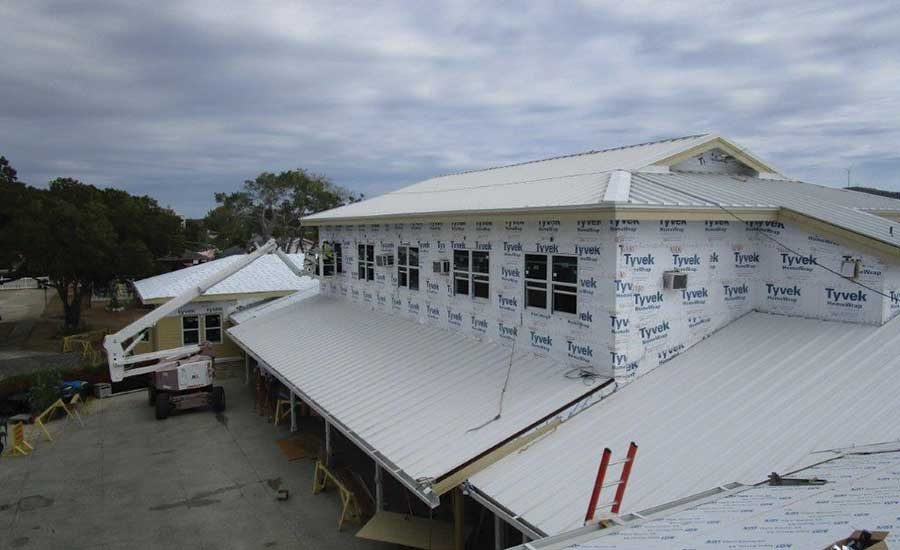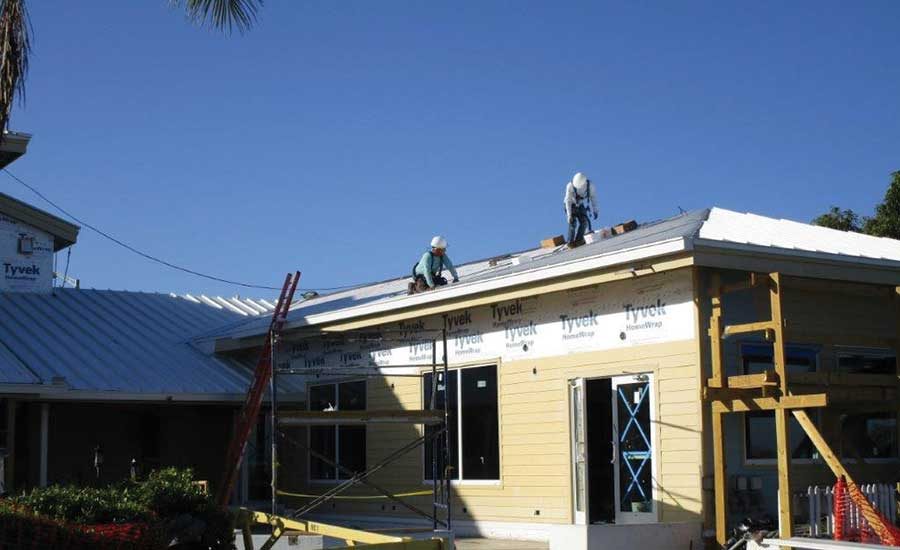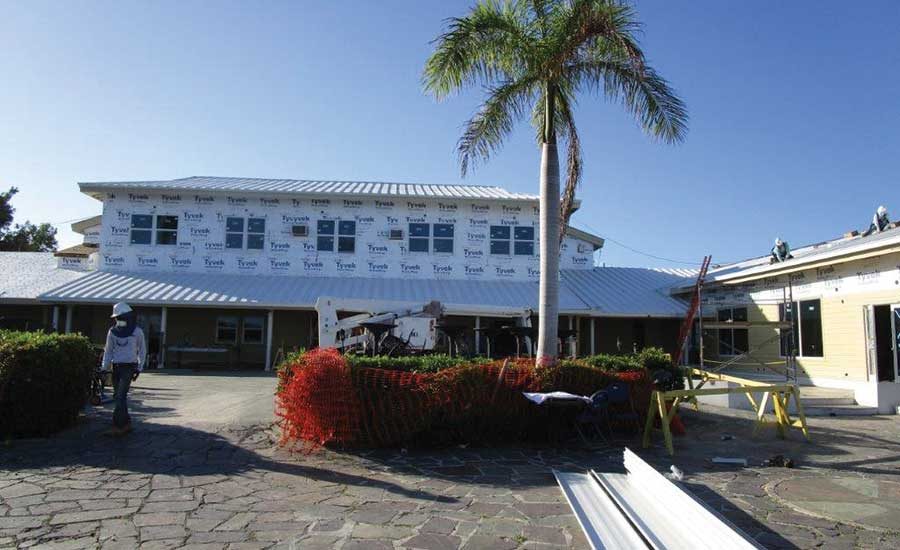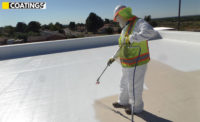Scott Biederman knew at a young age that roofing was for him.
“I started roofing and selling at 15, and have been doing it ever since,” the owner of Southern Coatings Inc. (SCI) said. “I would visit the jobsites after school and clean the grounds to help my father and drop off flyers around the neighborhood. That’s when I sold my first job.”
Shervin Biederman, his father, established SCI in 1978 in Broward County, Fla., and carved out a specific niche that’s proven to have staying power nearly 40 years later.
Always innovating, Shervin was one of a few at the time to take a chance on urethane foam as a roofing system in south Florida and turned out to be right. Spray foam is a proven system that’s specified on many commercial projects, and is a growing business model for established roofing firms as well as the next generation of roofing contractors emerging in Florida. It laid the groundwork for a successful roofing enterprise that the younger Biederman has grown to include services from other markets including metal, shingles, tile, BUR and more.
He took control of the company in 2013 and continues the family-business spirit of innovation, commitment to high-quality work and a willingness to roof anywhere at any time philosophy that he learned from his mentor.
Biederman said he vividly remembers one of the company’s first large jobs that took workers and his entire family off the American mainland. The project was reroofing the Frenchman’s Reef in St. Thomas Virgin Islands. The large, popular beachfront resort overlooks the famous Charlotte Amalie Harbor, and due to the island’s heavy reliance on tourism year-round, the project came with an aggressive production schedule. Biederman packed his family up for several months and reroofed the hotel in 1981. The job turned out to be a milestone project and allowed the company to purchase much-needed new equipment and invest in other areas.
“It gave our family a good start,” the younger Biederman reflected.
Now the company has roughly 40 employees setup in different divisions: a roofing division that covers all installations of commercial and residential projects; a maintenance division that handles repairs, annual maintenance, and urethane foam re-coats; and a separate urethane foam division for new installations.
Though hit hard financially by the Great Recession from 2008-11, SCI survived the drought due to its diversity and resiliency, said Heidi Biederman, Scott’s wife of 22 years. She formally joined the business in 2010 and quickly put her hospitality management degree and keen attention to detail to work. Her first task was reaching out to every client in their decades-old database and offering free roof inspections as a way to touch base and generate leads. As a result, the company now offers a comprehensive line of roofing services from installing all roofing systems to providing annual maintenance programs, repairs, and necessary re-coats.
Eye on Safety, Education
The company’s evolution is a testament to lessons learned over nearly four decades of service. Some that were learned the hard way. Biederman said that roughly 20 years ago, SCI was hit with several serious job-related injuries, marking what he described as among the worst business experiences of his career.
He responded with a renewed emphasis on safety and took a closer look at all company protocols to make improvements.
SCI now has a written safety plan and each crew member is required to pass the OSHA 10 course and complete several safety videos during orientation prior to working in the field. Every supervisor must pass OSHA 30 to stay on the jobsite. A full-time safety supervisor conducts bilingual weekly safety meetings, as well as daily spot-checks on all jobs.
Biederman said all crew members are outfitted with personal protective equipment (PPE) and are required to use the appropriate PPE for each job. As a backup, the company’s workers’ compensation insurance carrier performs quarterly spot-checks at the company’s request. Incentivizing compliance and performance is key, he said.
“All feedback is shared during the weekly meetings where crew members and foreman are recognized for exceptional organization, cleanliness, and safety,” he explained. It’s not uncommon for gift cards to be awarded for crews to have lunch together, and the company often posts crew photos on the wall at headquarters, on the company website and its Facebook page with honors.
The reward system is used to enhance quality as well as safety. Quality control inspections occur during each project, and company officials recognize foreman and crew for exemplary performance. Third-party inspections on commercial work are often required for manufacturer warranties where only a 10-score out of 10 is acceptable.
Continued training including, but not limited to safety, occurs through supplier training courses and certification programs. Suppliers, on occasion, will conduct classroom-style instructional courses in addition to hands-on mock demonstrations where each crewmember participates. Biederman said the spray foam division takes digital courses every two years, and that crew members participate in supplier certification courses and receive handbooks disturbed by the National Roofing Contractors Association.
“We create a good working atmosphere by organization and training,” Biederman said. “We take our time during the hiring process to try to handpick those who are seeking a roofing career and not just a job.”
Turnover is relatively low, he said, and loyalty is often rewarded as the company regularly looks to promote from within. Employees are encouraged to seek higher levels of education and can even receive company financial assistance. A 401k program with a company match is also in place.
Loyalty is also rewarded externally. Biederman said there’s also an office policy that basically encourages catering to customers and delivering anything they need in a timely fashion, and in a friendly and professional manner. It’s essential to also establish one point of contact with the customer to limit confusion.
“We believe giving the customer value for their money of course, by installing proper workmanship and keeping our word,” Heidi explained. “We are willing to go above and beyond for our customers.”
That helps build strong relationships — some stretching longer than three decades — and establish a healthy reputation that generates leads.
Biederman said the company invests in traditional yard signs and banners on active jobsites, but doesn’t focus much on advertising in what’s historically considered a saturated roofing market.
Other than that, Biederman said 99 percent of SCI’s business comes from word-of-mouth marketing and networking with builders and property owners.
The Cuba Job
That networking effort recently paid dividends with another milestone project — completing a rooftop on the oldest overseas U.S. Naval base at Guantanamo Bay, Cuba.
Guantanamo is a self-contained destination with a secure perimeter marked with electrical fences and armed guards. It’s about nine miles long along the southern coastline on Cuba’s east end.
Biederman earned the job after meeting with the general contractor, Jacksonville-based Ratclliff Construction, Inc. The mission was to reroof the nearly-century old Bayview Club, which served as the officer’s club and dining hall for U.S. Navy personnel stationed there. The two-story colonial style building had a shingle roof covering roughly 18,000 square feet that was badly in need of repair. SCI offered a standing seam metal roof with a 20-year warranty, and applied it while other contractors replaced all the siding and windows.
Logistics were difficult. Security clearances through customs and the military ranged from four-six weeks for employees. Once approved, crews had to travel there on a small jet and spend weeks at a time working in desert-like conditions. Materials were shipped from Jacksonville and inventory had to be carefully measured and accounted for on each phase of the job.
“They check you all out and are pretty serious about needing to get you clear,” Biederman said. “And you have to bring everything with you, and more, in case something gets damaged. You can’t go run to Home Depot down there.”
Despite the company’s history of work in the Caribbean, it was the type of job that frankly hadn’t crossed Biederman’s mind largely because Cuban territory was seemingly off limits to American businesses since communists seized control in the 1950’s. That began to change in 2014 when members of former President Barack Obama’s administration started meeting in secret with Cuban dignitaries to negotiate terms of a possible warming of diplomatic relations that remained icy since the beginning of the Cold War.
The result was a formal normalization agreement between the two countries, and removal of Cuba from the U.S.’s State Sponsors of Terrorism list in 2015.
Being somewhere that you weren’t exactly welcome for nearly half-a-century presented some interesting tests for the company and its crewmembers, Biederman said. That and the timely thawing of relations with Cuba made the project more special.
“I was really excited about it because it’s a unique job, and given the timing of it all,” he said.
Going Higher and Harder
Working in unpredictable and stressful settings is nothing new to the SCI team. They were reroofing the Broward County Jail in fall of 2005 when — on the heels of Hurricane Katrina, Hurricane Wilma struck and clobbered south Florida with 125 mph winds and torrential rain. The storm killed 25 people and cut power to a then-record 3.2 million residents in a 150-mile span across the state for weeks.
Wilma destroyed much of the jail roof and cut off fuel, running water and electricity. As sewage backups and other unsanitary conditions persisted, unrest spread among the inmates within the facility and they started to challenge their jailers.
“The inmates were rioting and we encountered some dangerous situations while attempting to dry them in,” Biederman explained. “SWAT members got the situation under control eventually but it was a very unique and challenging situation.”
His advice to roofers: Don’t shy away from ‘higher and harder’ projects, but always be aware of your surroundings on the job, whether it’s a prison with rioting inmates, or a quiet neighborhood that features homes with unique or special roofs that can become sales tools at the kitchen table to earn that next job.
“Canvas neighborhoods and take pictures of what you like. We can perform an iRoof of a property showing the customer what their home or building would look like with different roofing systems and colors,” he said.
He also notes the importance of working closely with suppliers — to the point where he often feels they’re on the jobsite with the crew. It’s allowed SCI to maintain strong relationships with well-established names in the industry such as ABC Supply, Covestro (which recently sold its spray polyurethane foam system house to Accella Polyurethane Systems LLC), Allied Building Products, IKO, and GAF.
He’s also working on a succession plan and sought professional help and advice to put in place procedures for the company to continue successfully upon his retirement.
“We love what we do and we have a core group of loyal employees who have been with SCI for many years,” Biederman said. “We’re constantly trying to improve ourselves as a company in all areas but keeping in mind we want SCI to be a nice place to work.”









Report Abusive Comment